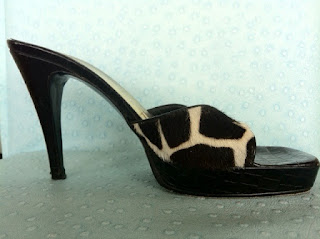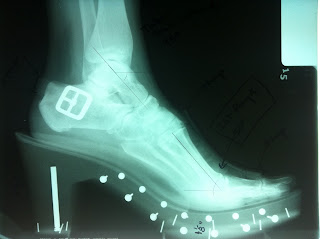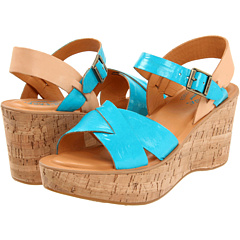The Effects of High Heels
On Your Feet...
For the woman who is lucky enough to say,
"I've been wearing heels for years and I've never had any foot problems" -
I would say, "You're one of the lucky ones -
so far..."
In my mind,
it's the same thing as the person who says,
"My dad's been smoking a pack a day of cigarettes for fifty years and he's never had a problem."
In both cases,
the only way to figure out if you are one of the 'lucky ones' that won't develop foot pain or
lung cancer is -
you have to wear heels and smoke like a chimney for years and see what happens...
It's a gamble!
Don't gamble with your body!
Protecting your feet and taking care of your body will significantly improve your quality of life, keep you active longer and decrease the chance of injury.
Let's talk feet...
Please don't get me wrong -
I'm not against wearing high heels!
I do, however, have specific recommendations for the type of shoes you should be looking for if you want to wear high heels based on your individual biomechanics.
There are many women who will not be able to tolerate high heels due to the genetic biomechanical structure of their feet.
Whether or not you can tolerate high heels is directly related to the biomechanical structure of your feet.
The biomechanical structure of your feet is genetic and runs in families and it can also be
related to previous injury.
One example:
If you have Hallux Limitus, which is decreased motion of your first toe joint and you try to wear an ultra high heel
(i.e. you are trying to push motion through a joint that doesn't have motion)
you are at risk for developing bone spurs, osteoarthritis, degenerative joint disease and lateral ankle strain (to name a few).
Determining what type of shoe that works best for you is pathology specific!
Basically, what type of biomechanical foot structure you have or what type of foot problems you have
will determine what type of shoe will be ideal for you...
will determine what type of shoe will be ideal for you...
What works for one person, will not necessarily work for another person.
Let's look at some pictures...
Ah, yes, those were the days!
Pre-Podiatry shoes...
And, yes, they did come out of my closet and, although I haven't worn them in two decades,
I can't bring myself to throw them away.
You know what I'm talking about, ladies...
What's wrong with these heels:
1. With a true heel height of 3 and 1/2 inches, they are too high and putting too much pressure across my foot and ankle joints - not to mention my knee, hip and lower back, which can cause joint damage, muscle strain, tendonitis, bunions, hammertoes and a multitude of other problems.
2. There is no midfoot or rearfoot strapping, which is forcing me to put more strain and wear-and-tear on my tendons, joints, and muscles - not to mention my knees, hips and lower back. With no rearfoot strapping, I am struggling to keep my foot in this shoe!
I am crunching down my toes so that I can stay in the shoe, which causes more inflammation, swelling, strain and damage.
This can cause 'Tired Leg Syndrome' as well as a multitude of other problems.
3. The combination of the aggressive angle of the high heel and lack of midfoot and rearfoot strapping is forcing my joints, tendons and muscle to struggle to stay in my shoe.
Ouch.
Why this heel is better than the previous heel:
1. Because of the wedge style, this shoe has a true heel height of 3 inches. I'm getting the height (for fashion) but not as aggressive 'tilt' on my foot and ankle joints as the previous shoe.
2. There is midfoot and rearfoot control, which helps decrease mechanical strain, the chance of injury and pain.
3. This heel will not work for everyone, but it is better than the first shoe we looked at...
This is the Dansko Rowena and it is currently my 'go-to' casual heels to wear with jeans.
Why this shoe is better than the
previous two shoes choices:
1. The wedge in the front of the shoe is thick and rigid for more biomechanical control and increased protection for the foot structures such as joints, tendons and muscles.
The true heel height is 2 and 1/8 inches.
2. There is midfoot and rearfoot control for more biomechanical control, which means less strain and more comfort.
Wearing high heels
changes your gait and the biomechanics
of your feet, ankles, knees, hips and
lower back and...
Inappropriate High Heels can cause:
*Degenerative Joint Disease
*Osteoarthritis
*Forefoot Pain
*Metatarsalgia
*Capsulitis
*Plantar Plate Injury
*Lateral Ankle Strain
*Bunions
*Tailor's Bunions
*Hammertoes
*Morton's Neuromas
*Tendonitis
*Knee, Hip & Lower Back Pain
*Blisters
*Corns & Calluses
For Recommendations for Comfortable Shoes that are Pathology Specific -
please refer to my blog:
http://podiatryshoereview.blogspot.com
Within the Blog,
Use the 'Search' box to look up:
Top 10 Comfortable Sandals
Top 20 Comfortable Women's Dress Shoes
Top 5 Comfortable Walking Shoes
Hope this was helpful!
Dr. Cathleen A. McCarthy
:)










